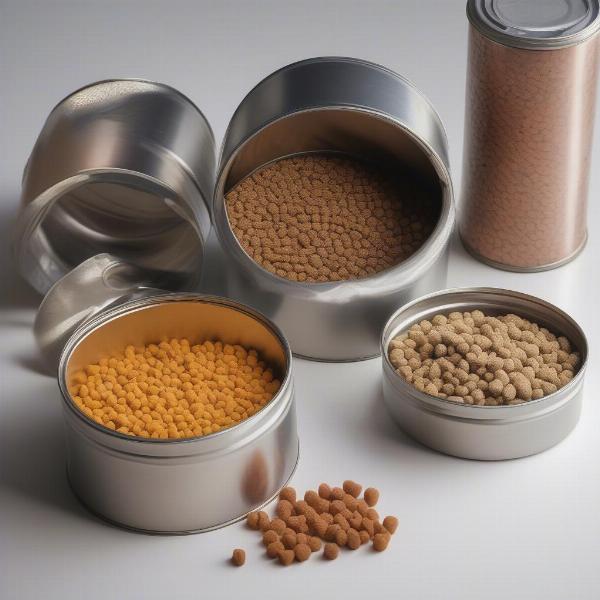Choosing the right dog food for older dogs is crucial for maintaining their health and well-being. As dogs age, their nutritional needs change, and selecting a diet tailored to these changes can significantly impact their quality of life. This article will guide you through the essential factors to consider when choosing the best dog food for your senior companion.
Understanding Your Senior Dog’s Nutritional Needs
Senior dogs, typically those over seven years old, experience a gradual decline in metabolic rate and activity levels. This means they require fewer calories to maintain a healthy weight, and excess calories can lead to obesity, which can exacerbate age-related health issues like arthritis. However, their need for specific nutrients, such as protein, increases to support muscle mass and organ function.
Additionally, older dogs may experience digestive issues. Choosing a food that is easily digestible with high-quality ingredients can alleviate these problems. Look for foods with prebiotics and probiotics to support gut health.
Key Ingredients to Look For in Senior Dog Food
When selecting dog food for older dogs, prioritize high-quality protein sources like chicken, fish, or lamb. These provide essential amino acids necessary for maintaining muscle mass. Healthy fats, such as omega-3 fatty acids, are also vital for joint health, cognitive function, and skin and coat condition.
Focusing on Joint Health
Joint pain is a common ailment in senior dogs. Look for food containing glucosamine and chondroitin, which are known to support joint health and mobility. These supplements can help manage arthritis and improve your dog’s comfort.
Supporting Cognitive Function
As dogs age, their cognitive function may decline. Including antioxidants like Vitamin E and C in their diet can help protect brain cells and potentially slow down cognitive decline.
Different Types of Senior Dog Food
Senior dog food comes in various forms, including dry kibble, wet food, and raw diets. The best choice for your dog depends on their individual preferences and health conditions. For example, dogs with dental issues may benefit from wet food, while dogs prone to weight gain may benefit from a carefully portioned dry kibble diet.
Dry Kibble
Dry kibble is often the most convenient and economical option. Choose a smaller kibble size for easier chewing for senior dogs.
Wet Food
Wet food can be more palatable for picky eaters or dogs with dental problems. It also has higher moisture content, which can be beneficial for dogs prone to dehydration.
Raw Diets
Raw diets are gaining popularity, but consult with your veterinarian before switching your senior dog to a raw diet to ensure it meets their specific nutritional needs and avoids potential health risks.
 Different Types of Senior Dog Food
Different Types of Senior Dog Food
Monitoring Your Senior Dog’s Weight and Health
Regularly monitor your senior dog’s weight and overall health. Adjust their food portions as needed to maintain a healthy weight. Consult your veterinarian for personalized dietary recommendations based on your dog’s specific breed, age, activity level, and any underlying health conditions.
Conclusion
Choosing the right dog food for your older dog is an essential part of ensuring their health and happiness in their golden years. By understanding their changing nutritional needs and selecting a food rich in high-quality protein, healthy fats, and essential nutrients, you can help your senior companion thrive and enjoy a fulfilling life. Remember to consult your vet for tailored advice.
FAQ
- When should I switch my dog to senior food? Generally, dogs are considered seniors around seven years old, but this can vary based on breed and size. Consult your vet for personalized advice.
- What are the signs my senior dog needs a different food? Changes in weight, coat condition, energy levels, and digestive health can indicate a need for dietary adjustments.
- Is it okay to mix wet and dry food for senior dogs? Yes, many dog owners choose to combine wet and dry food for variety and to cater to their dog’s preferences.
- Can I give my senior dog human food? Some human foods are safe for dogs in moderation, but many are toxic. Always consult with your veterinarian before giving your dog any human food.
- How often should I feed my senior dog? Most senior dogs benefit from two smaller meals per day to aid digestion and prevent weight gain.
- What if my senior dog is a picky eater? Try different flavors and textures of senior dog food, or consider adding warm water or low-sodium broth to dry kibble to make it more appealing.
- Are supplements necessary for senior dogs? While a balanced senior dog food should provide most necessary nutrients, your vet may recommend specific supplements based on your dog’s individual needs.
Related Articles
best pet food for older dogs
supervite dog food
best rated dog food for senior dogs
whitby dog friendly cottages
ILM Dog is a leading international online resource dedicated to providing expert advice and information on all aspects of dog care and well-being. From breed selection to senior care, we offer comprehensive guides and resources to help dog owners make informed decisions. Our expertise covers nutrition, health, training, and much more, ensuring you have the knowledge to provide the best possible care for your canine companion. Contact us for personalized advice: Email: [email protected], Phone: +44 20-3965-8624. For more valuable insights and tips on dog care, visit ILM Dog.